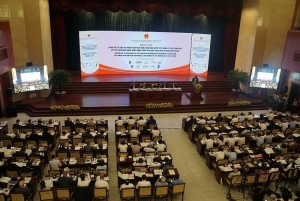Climate tech investment hits the spotlight
 |
Golden Gate Ventures, a venture capital (VC) fund in Southeast Asia founded by Silicon Valley natives, and Venture East, one of India’s longest-standing VC firms, released The Essence of Climate Tech for India and Southeast Asia report on November 29.
The report reveals that over $70 billion was pumped into climate tech investments in 2022, nearly double 2021’s record total. Southeast Asia and India net a humble 7 per cent, but this is set to change dramatically over the next 5 years, with their climate tech sector projected to hit $350 billion by 2030.
Michael Lints, partner at Golden Gate Ventures said, "We are witnessing an unprecedented moment in the history of climate tech. Every single government in Southeast Asia and India is doubling down on market-making policy shifts for the first time."
"Key technologies like sustainability accounting, vertical farming, energy efficiency, and electric mobility will reach mainstream adoption in the next five years, and one-fifth of the world’s largest corporations that have commitments to net-zero emissions are making impactful changes to their operations. We are on the threshold of a climate tech boom in Southeast Asia and India," Lints continued.
Across Southeast Asia and India, the strong regulatory momentum that started in 2019 has taken hold. In Vietnam, the government implemented new environmental protection laws in early 2022. These require Vietnam to create rules for managing and trading carbon credits and running domestic carbon trading platforms by 2027, with full operation expected by 2028.
The Ministry of Natural Resources and Environment will be authorised to certify carbon credits and emissions quotas as eligible to participate in carbon trading platforms.
Furthermore, regulators across India and Southeast Asia are rolling out a range of both demand- and supply-side incentives and increasing charging infrastructure with a clear goal of making electric mobility more mainstream.
The electric vehicle (EV) market is disrupting the traditional automotive sector, creating a more level playing field for new entrants across the entire value chain – from parts production to battery technology. The demand for batteries is rising in tandem with the growing EV market.
Among them, Vietnam’s EV sector is dominated by a single automotive manufacturer, VinFast, whose production covers electric two-wheelers, four-wheelers, and passenger buses. There are emerging private players such as DatBike, and Modmo e-bikes that also operate in the space.
The Vietnamese government has been encouraging the purchase of locally manufactured vehicles over imported ones. The main determinant of a vehicle's total cost of ownership now depends more heavily on its country of origin than on its fuel type.
In 2022, the Vietnamese government implemented free registrations for battery electric cars registered for the first time, effective for three years from March 1, 2022.
 | Vietnam turns climate change challenge into opportunity by 4.0 tech Vietnam, especially the Mekong Delta area, can take advantage of the achievements and technology of the Fourth Industrial Revolution to resolve challenges caused by climate change. |
 | Funding for climate tech startups in Southeast Asia hits record high in 2022 Climate tech startups are creating a buzz in the Southeast Asia region thanks to a trend towards sustainable development. |
 | Climate tech startups a catalyst for Vietnam’s net-zero future I remember landing in Hanoi for the first time in early 2010, impressed by endless streams of motorbikes. As a practitioner pursuing sustainable development, I thought about the emissions fuming out of the many vehicles. Over a decade passed, and when I landed again in Hanoi a few months ago, I still found myself surrounded by swarms of motorbikes. But things are about to change. |
What the stars mean:
★ Poor ★ ★ Promising ★★★ Good ★★★★ Very good ★★★★★ Exceptional
 Tag:
Tag:
Related Contents
Latest News
More News
- SK Innovation-led consortium wins $2.3 billion LNG project in Nghe An (February 25, 2026 | 07:56)
- THACO opens $70 million manufacturing complex in Danang (February 25, 2026 | 07:54)
- Phu Quoc International Airport expansion approved to meet rising demand (February 24, 2026 | 10:00)
- Bac Giang International Logistics Centre faces land clearance barrier (February 24, 2026 | 08:00)
- Bright prospects abound in European investment (February 19, 2026 | 20:27)
- Internal strengths attest to commitment to progress (February 19, 2026 | 20:13)
- Vietnam, New Zealand seek level-up in ties (February 19, 2026 | 18:06)
- Untapped potential in relations with Indonesia (February 19, 2026 | 17:56)
- German strengths match Vietnamese aspirations (February 19, 2026 | 17:40)
- Kim Long Motor and AOJ Suzhou enter strategic partnership (February 16, 2026 | 13:27)






















 Mobile Version
Mobile Version